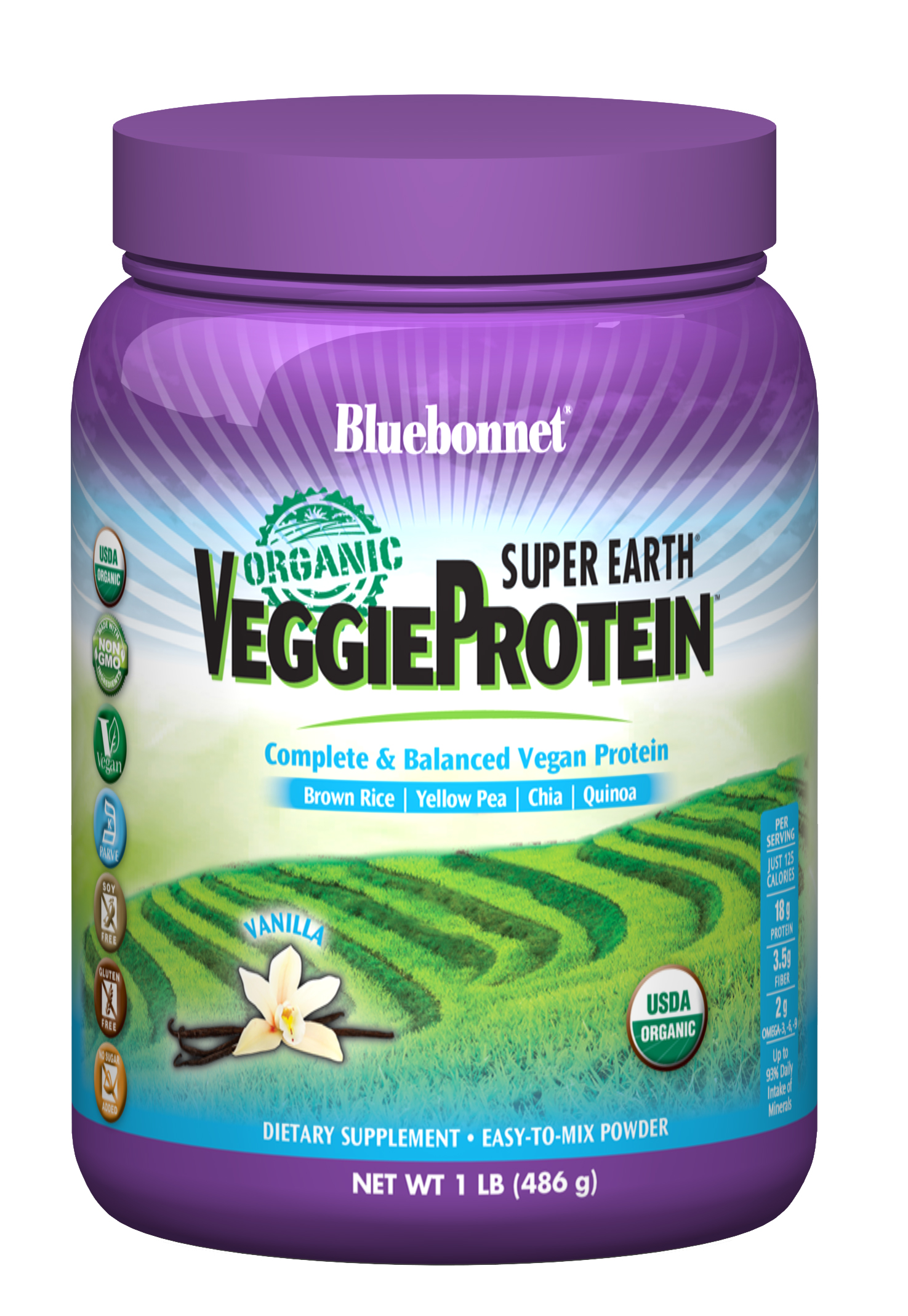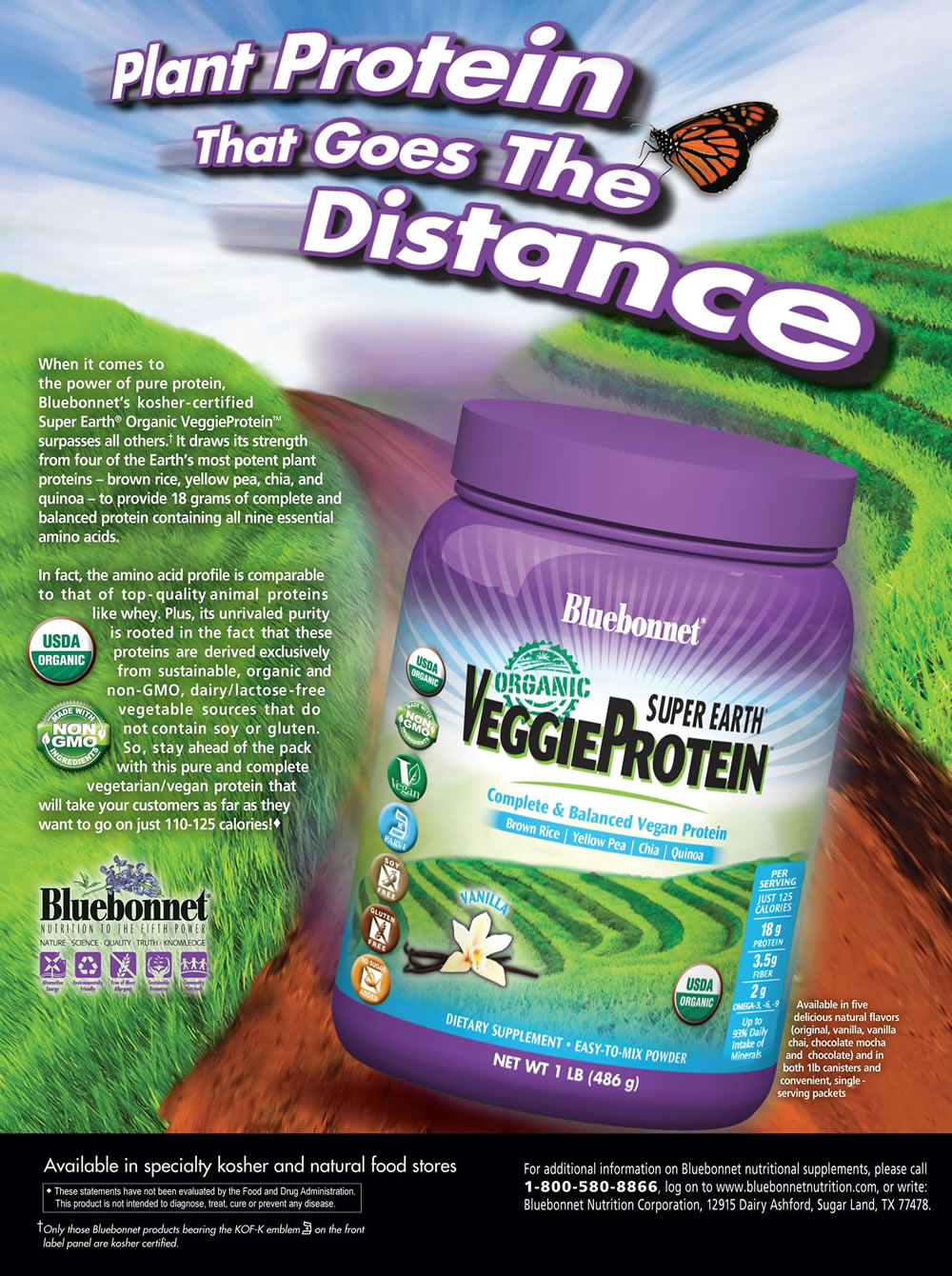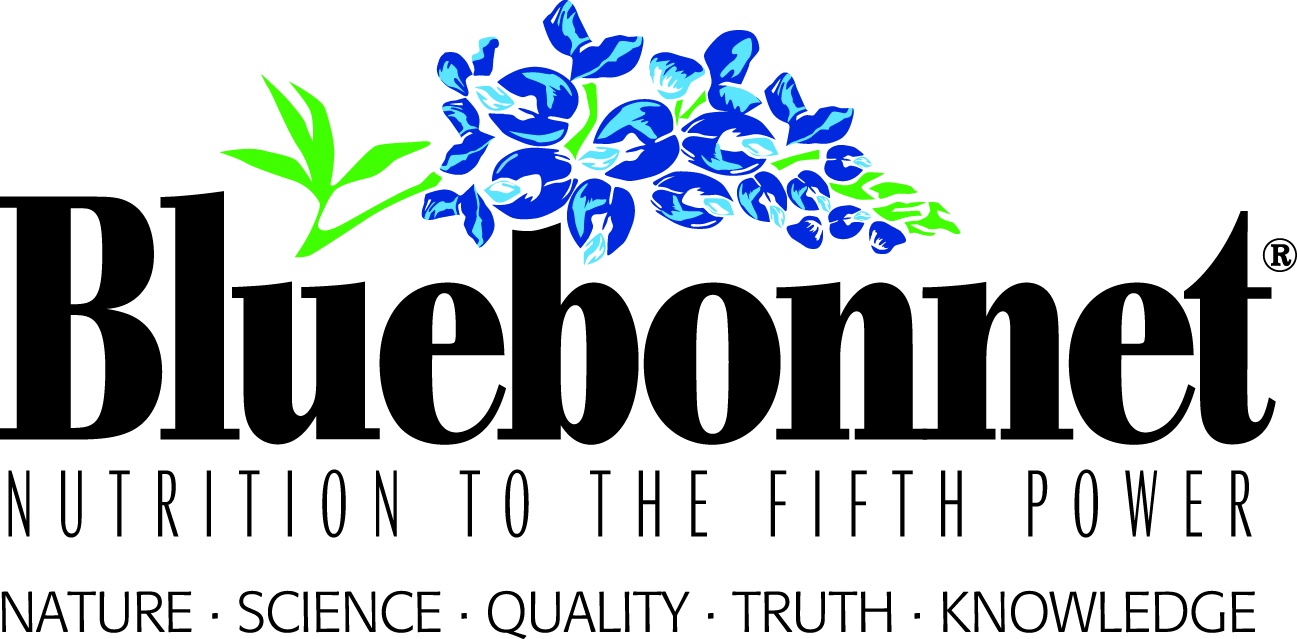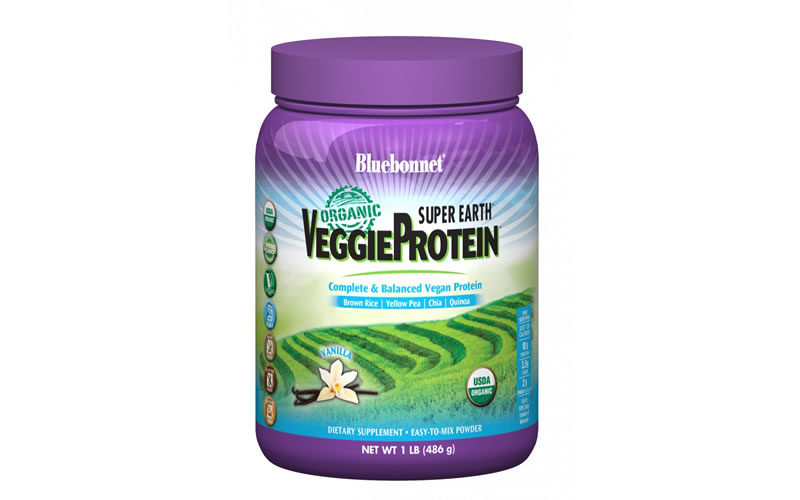Q: What are the myths surrounding vegetarian/vegan diets and protein intakes?
A:The quality of protein you consume is dependent on where it is purchased, especially when it comes to plant-based proteins, which is why Bluebonnet’s Super Earth® Organic VeggieProtein™ Powder is only available in health food stores since they are known for carrying the broadest range and highest quality vegetable-sourced proteins on the market. With an increasing number of vegans and vegetarians, the quality of protein from plant sources has become a prevalent topic. Those who want to move away from meat, fish and/or dairy question whether a vegetarian/vegan diet can provide adequate amounts of protein or whether vegetarian protein is as complete and balanced as animal protein. The following chart debunks the myths surrounding vegetarian/vegan diets and protein intake:
| Myths and Realities About Plant-Based Protein |
| Myth: Plant proteins are incomplete (i.e., lack specific amino acids) Reality: Usual dietary combinations of plant proteins are complete; specific plant proteins may be low in specific amino acids |
| Myth: Plant proteins are not as “good” as animal proteins Reality:Quality depends on the source and dietary mixture of plant proteins; can be equivalent to high-quality animal protein |
| Myth: Proteins from different plant foods must be consumed together in the same meal to achieve high nutritional value Reality: Proteins do not need to be consumed at the same time, the balance over the day is of greater importance |
| Myth: Plant proteins are not well digested Reality: Digestibility can vary according to plant source and preparation; digestibility can be high |
| Myth: Plant proteins alone are not sufficient to achieve adequate protein intake Reality: The intake/balance of essential amino acids and nitrogen are crucial and can be adequately met from plant- and animal-sourced protein |
| Myth: Plant proteins are imbalanced and this limits their nutritional value Reality: There is no evidence that amino acid imbalances per se are important; possible imbalances can be created by inappropriate amino acid supplementation, but this is not a practical problem |
| Chart adapted from: Young VR, Pellett PL. Plant proteins in relation to human protein and amino acid nutrition. Am J Clin Nutr 1994;59 (suppl):1203S-1212S. |
A:According to the 2010 Dietary Guidelines for Americans, 10–35% of caloric energy should come from
 good, high-quality protein. Science shows that a vegetarian diet can easily meet human dietary protein requirements as long as the basic energy needs (in terms of calories) are met and a variety of foods (e.g., legumes, soy products, grains, nuts and seeds) are consumed throughout the day.
good, high-quality protein. Science shows that a vegetarian diet can easily meet human dietary protein requirements as long as the basic energy needs (in terms of calories) are met and a variety of foods (e.g., legumes, soy products, grains, nuts and seeds) are consumed throughout the day.Q: Why combine vegetarian sources of protein?
A:Plant-based foods like legumes, most whole grains, fruits, vegetables, nuts and seeds all provide amino acids but are not complete proteins by themselves. However, the body does form an amino acid pool from these foods eaten throughout the day, which can be used to provide all of the necessary amino acids required in the diet. There are different combinations of plant foods that can be selected, so you can choose which foods you prefer. For example, two of the most abundant plant sources of protein available for supplementation—other than soy—are brown rice (grain) and peas (legume). As a complement to rice protein, pea protein provides all the necessary amino acids that are lacking in rice to make a complete protein source, which is why Bluebonnet’s Super Earth® Organic VeggieProtein™ Powder provides the two in combination, along with quinoa and chia.
Q: What are the health benefits of vegetarian-sourced protein compared to animal-based protein?
 A: In recent years, interest in animal-free foods has increased tremendously due to factors like the use of growth hormones and antibiotics in animal feed, as well as the rise of nutritionally dependent illnesses, like type II diabetes, cardiovascular and digestive diseases, along with cultural/religious practices that restrict or eliminate animal consumption.
A: In recent years, interest in animal-free foods has increased tremendously due to factors like the use of growth hormones and antibiotics in animal feed, as well as the rise of nutritionally dependent illnesses, like type II diabetes, cardiovascular and digestive diseases, along with cultural/religious practices that restrict or eliminate animal consumption.Q: What should you look for in a quality plant-based protein?
A:When it comes to protein, it’s not a numbers game. Look for plant-based protein supplements that have significant quantities of the right combination of vegetarian-sourced protein, which provide a complete and balanced amino acid profile similar to popular animal-based proteins like whey.
For example, each scoop of Bluebonnet’s Super Earth® Organic VeggieProtein™ Powder offers significant quantities of four of the highest quality, nutritionally dense vegetable proteins on the market (brown rice, yellow pea, quinoa and chia), packing a mean punch in terms of protein and nutritional potency per serving:
• 18 grams of complete and balanced protein
• 3.5 grams of fiber
• 2 grams of essential fatty acids (omega-3,-6 and -9s)
• Up to 93% of the daily value for some minerals
• Just 125 calories!
Bluebonnet’s Super Earth® Organic VeggieProtein™ Powder out-paces the competition by delivering an amino acid profile similar to whey—along with all of the dietary benefits important to vegetarians and vegans:


 also a Bachelor of Science Degree in Nutrition and Foods from Texas State University. Mrs. MacDonald is currently the Senior Director of Research & Development as well as the National Educator at Bluebonnet Nutrition where she investigates new ingredients, directs the launch of new products, and provides industry training on numerous subjects as it relates to the connection between nutrition and health. She is a frequent editorial contributor and lecturer on the benefits surrounding the responsible use of supplements.
also a Bachelor of Science Degree in Nutrition and Foods from Texas State University. Mrs. MacDonald is currently the Senior Director of Research & Development as well as the National Educator at Bluebonnet Nutrition where she investigates new ingredients, directs the launch of new products, and provides industry training on numerous subjects as it relates to the connection between nutrition and health. She is a frequent editorial contributor and lecturer on the benefits surrounding the responsible use of supplements.References:
Mangels AR, Messina V, Melina V. (2003). Position of The American Dietetic Association and Dietitians of Canada: Vegetarian diets.J Am Diet Assoc, 103, 748-65.
Marsh KA, Munn EA, Baines SK. (2012). Protein and vegetarian diets.Medical Journal of Australia, 1 (Suppl 2), 7-10.
Teunissen-Beekman KFM, Dopheide J, Geleijnse JM, Bakker SJL, Brink EJ, de Leeaw PW, van Baak MA. (2012). Protein supplementation lowers blood pressure in overweight adults: Effect of dietary proteins on blood pressure (PROPRES), a randomized trial.American Journal of Clinical Nutrition, 95, 966-971.
Young VR, Pellett PL. (1994). Plant proteins in relation to human protein and amino acid nutrition.Am J Clin Nutr, 59 (suppl),1203S-1212S.
Published in WholeFoods Magazine, August 2015, (online 7/17/2015)










